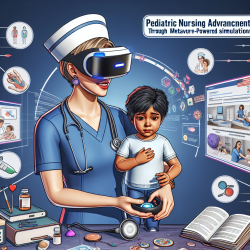The rapid advancements in technology have brought innovative solutions to the field of nursing education. One such promising approach is the use of metaverse-based simulations for training nursing students. A recent study titled "Efficacy Testing of a Multi-Access Metaverse-Based Early Onset Schizophrenia Nursing Simulation Program: A Quasi-Experimental Study" provides valuable insights into how this technology can be leveraged to improve nursing skills, particularly in the context of early onset schizophrenia.The study, published in the International Journal of Environmental Research and Public Health, examined the effects of a multi-access, metaverse-based simulation program on nursing students' knowledge, critical thinking ability, and communication skills. The program was based on Raskin and Rogers’ person-centered therapy and was designed to provide a virtual clinical experience.Key Findings:
- Participants in the experimental group showed a significant increase in knowledge about early onset schizophrenia compared to the control group.
- Critical thinking abilities were notably enhanced in students who used the metaverse-based simulation.
- Communication skills, essential for effective therapeutic interactions, improved significantly among the experimental group.
These outcomes suggest that incorporating metaverse-based simulations into nursing education can be a highly effective way to bridge the gap left by limited clinical practice opportunities, especially in psychiatric units. The metaverse provides a safe, controlled environment where students can interact with avatars representing patients and healthcare professionals, allowing for repeated practice and immediate feedback.For practitioners looking to improve their skills, the study highlights several actionable strategies:
- Adopt Metaverse Simulations: Integrate metaverse-based simulations into training programs to enhance knowledge and practical skills.
- Focus on Therapeutic Communication: Use person-centered therapy principles to guide interactions in the virtual environment.
- Utilize Structured Debriefing: Implement structured debriefing sessions to reflect on experiences and identify knowledge gaps.
The study also underscores the importance of further research to explore the long-term effects and broader applicability of metaverse-based training programs. Future studies should focus on overcoming technological limitations and ensuring the sustainability of training outcomes.In conclusion, the integration of metaverse-based simulations in nursing education holds great promise for improving the quality of training and ultimately, patient care. By leveraging this technology, we can create more effective and engaging learning experiences for nursing students.To read the original research paper, please follow this link:
Efficacy Testing of a Multi-Access Metaverse-Based Early Onset Schizophrenia Nursing Simulation Program: A Quasi-Experimental Study.










